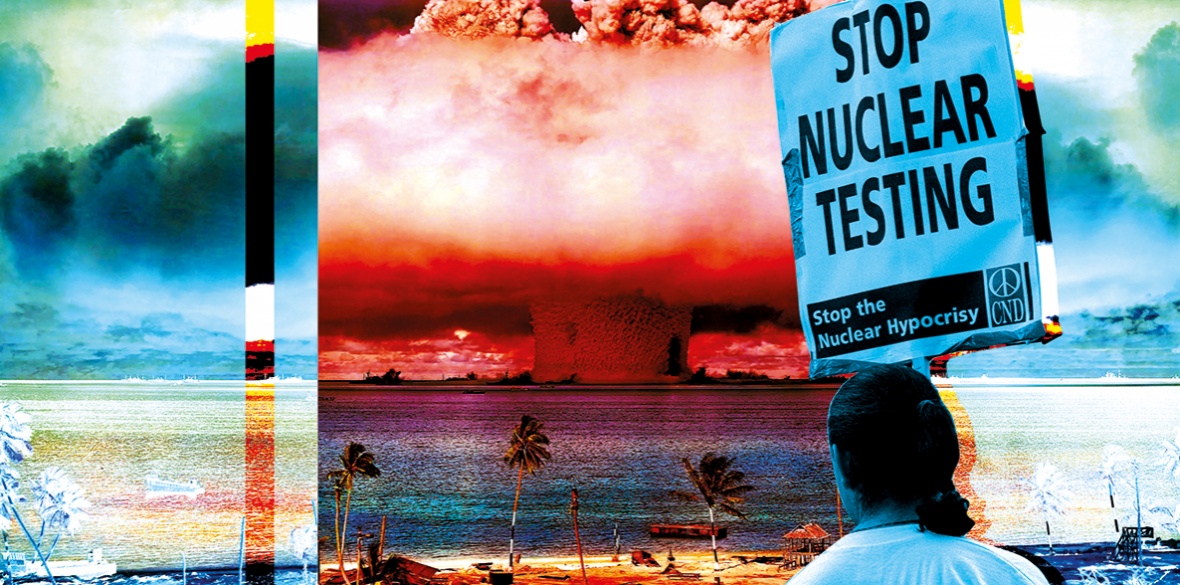This is the last article you can read this month
You can read more article this month
You can read more articles this month
Sorry your limit is up for this month
Reset on:
Please help support the Morning Star by subscribing here
IN THE fight for global nuclear disarmament — which has never been more necessary — it is important that our movement mobilises and unifies all sections of society, together with the international community that overwhelmingly wants peace and disarmament.
Whether through the nuclear Non-Proliferation Treaty (NPT), the Treaty on the Prohibition of Nuclear Weapons (TPNW), or nuclear weapons-free zones, it’s the states and peoples of the global South who have created the treaty architecture for a nuclear weapons-free world.
It’s high time that states — and movements — from the global North recognise that and put the communities most affected front and centre of their campaigns and priorities.
It is crucial for us to remind ourselves who has nuclear weapons, who has used them and who have suffered most from their consequences.
It is people of colour across the planet that are overly affected by these crimes against humanity that have been perpetrated, largely by white Western countries.
In 1945, the United States air force dropped atomic bombs on the Japanese cities of Hiroshima and Nagasaki — hundreds of thousands of people died right away.
Others died soon afterwards from burns and many, many more from the impact of radiation in the months and years that followed. By 1950, an estimated 340,000 people had died as a result of the two bombs.
It was reported that in 1964 human rights activist Malcolm X told a group of Hibakusha — Japanese survivors of the nuclear bomb — “You have been scarred by the atom bomb. You just saw that we have also been scarred. The bomb that hit us was racism.”
This is exactly right. Look no further than where Western governments have chosen to carry out their nuclear testing.
In the British-colonised islands of Kiribati, the British government undertook nuclear weapons testing between 1957-62.
They also tested at Monte Bello Island, then at Emu Field and Maralinga, all in Australia, between 1952 and 1958.
From 1946-58 the United States detonated 67 nuclear weapons test explosions over the Marshall Islands in the Pacific.
The US’s Nevada Test Site, appropriated by the US government in 1951, is on the traditional lands of the Western Shoshone and South Paiute peoples.
Around 928 nuclear tests have been carried out on Western Shoshone land since 1951, 100 in the atmosphere and the rest underground.
In the 1960s the French colonial government detonated bombs in the Algerian Sahara desert and tested another 41 nukes in French Polynesia, between 1966 and 1974.
All other nuclear weapons states have conducted tests on their own territories or underground.
In their disgusting pursuit of nuclear weapons, Britain, the United States and France have caused long-lasting humanitarian and environmental destruction.
They have vaporised entire islands, many people have died, babies have been born with birth defects never seen before, and generations of families are still battling with cancers and other radiation-related diseases.
And running alongside throughout, has been the terrible risk of nuclear use in war. Today it’s clear that little has changed in this respect.
The brinkmanship between those governments with the most nuclear weapons is at its highest for decades. We are all facing the worst-case scenario.
But when we discuss the terrifying consequences of nuclear war and weapons, it is important to understand that the creation of these weapons has already had horrific consequences for many black and indigenous people.
Nuclear weapons states are increasing and modernising their arsenals — including Britain. This is in opposition to what so many countries are fighting for, through signing and ratifying the Treaty on the Prohibition of Nuclear Weapons.
It’s no surprise that those leading that struggle are the countries of the global South – including those who have suffered so grievously as a result of nuclear testing.
But nuclear weapons don't just appear, there is a lead-up to their manufacture which often includes the decimation of sacred and indigenous lands through uranium mining.
The First Peoples of Australia know this all too well. The Australian government has prioritised uranium mining, ignoring the protests and rights of the First Peoples, whose living standards remain so far below those of their white counterparts.
Our fight against nuclear weapons here has to be in solidarity with those people who are losing their sacred lands, cultures and history, so that a tiny minority of powerful countries can create devastation globally. And that recognition and solidarity must be mirrored in the way we work here, in Britain.
We will only get stronger the more our movement looks like all the people on this globe that are fighting for survival — and the more it looks like our society.
We must reach out to all communities not just our traditional areas of support.
Rachel Earlington is parliamentary officer for Campaign for Nuclear Disarmament (cnduk.org).












